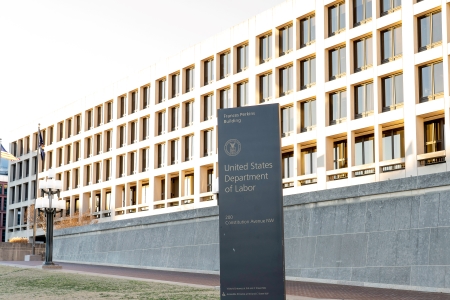 Testifying on behalf of Associated Builders and Contractors before the U.S. House Committee on Small Business last week, Mario Burgos, chief strategy officer, Prairie Band LLC, Albuquerque, New Mexico, urged lawmakers to rein in the Biden administration’s inscrutable and burdensome wage determination practices under the Davis-Bacon and Related Acts. Burgos detailed his efforts to comply with a byzantine process to determine prevailing wages on federal construction projects and said the U.S. Department of Labor’s recent rulemaking updating Davis-Bacon will only make compliance challenges worse, driving small contractors out of public works projects or even out of business.
Testifying on behalf of Associated Builders and Contractors before the U.S. House Committee on Small Business last week, Mario Burgos, chief strategy officer, Prairie Band LLC, Albuquerque, New Mexico, urged lawmakers to rein in the Biden administration’s inscrutable and burdensome wage determination practices under the Davis-Bacon and Related Acts. Burgos detailed his efforts to comply with a byzantine process to determine prevailing wages on federal construction projects and said the U.S. Department of Labor’s recent rulemaking updating Davis-Bacon will only make compliance challenges worse, driving small contractors out of public works projects or even out of business.
Speaking at the hearing “Burdensome Regulations: Examining the Effects of DOL Rulemaking on America’s Job Creators,” Burgos narrated the DOL’s investigation of his award-winning family business, Burgos Group, which resulted in the withholding of nearly $1 million in federal payments owed to the 17-year-old firm and a settlement costing the company hundreds of thousands of dollars plus legal fees. Ultimately, this action and the overly burdensome regulatory environment facing Burgos and his company were contributing factors to its sale to Prairie Band LLC.
”Unfortunately, the number of rapidly changing and ever-increasing federal and state regulatory requirements affecting the construction industry led us to conclude that the most prudent action would be to exit the business,” Burgos testified. “The recent DOL updates to regulations implementing the Davis-Bacon and Related Acts is just the latest example of additional burdens and barriers erected, which make it more difficult for small businesses to participate in the economic investments of the bipartisan Infrastructure Investment and Jobs Act or to support our nation’s defense missions.”
In its investigation, the DOL determined that, although Burgos Group paid its employees prevailing wages on a federal project under the Arizona Laborers’ Agreement posted on the DOL’s website, they were instead subject to the unpublished prevailing wage scheme of IBEW Local Union 570, which had “claimed the work.” Burgos was never notified of the electrical union’s claim, which affected the job classifications of 84 workers, resulting in a settlement with the DOL under which Burgos Group admitted no fault or wrongdoing.
“I do not believe that anyone at the DOL acted maliciously,” said Burgos. “Quite to the contrary, I believe that the subjective nature of the existing regulations created ambiguity, which puts a presumption of guilt on businesses and makes the enforcement and compliant responsibilities of DOL personnel more difficult.
“For decades, the DOL Office of Inspector General and Government Accountability Office have pointed to flaws in the DOL’s wage determination process, yet the DOL’s final rule does little to fix this problem,” said Burgos. “In fact, the new rule makes it worse by rescinding pro-taxpayer and commonsense policies that were enacted more than 40 years ago because they were not reliably producing a timely or local prevailing wage, as required by statute.
“My experience shows how difficult it can be to comply with DBA regulations when the correct wage determination is not easily determined,” said Burgos. “The revisions of the DBA, which will go into effect Oct. 23, 2023, further compound this problem. The DOL needs to publish union collective bargaining agreements publicly, or not apply this standard. Small businesses are hurt with cloak-and-dagger regulations.”
Burgos called on Congress to reduce the administrative and paperwork burden of complying with Davis-Bacon prevailing wage rules and eliminate the subjective nature of DBA compliance.
More information on the recent Davis-Bacon rulemaking is available at abc.org/davisbacon.
[Editor's note: the hearing video begins at 17:16.]
Authored by Associated Builders and Contractors and originally published on abc.org


